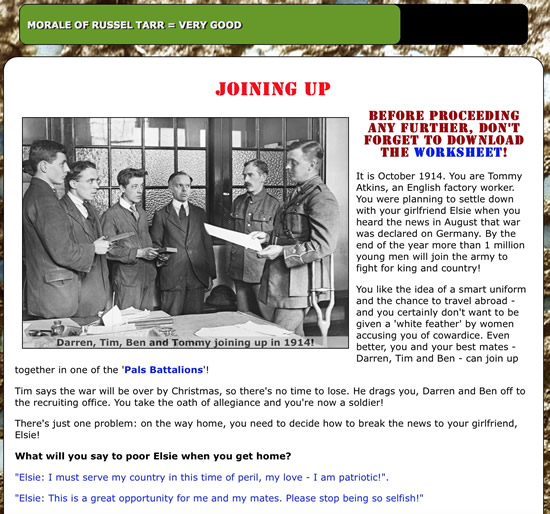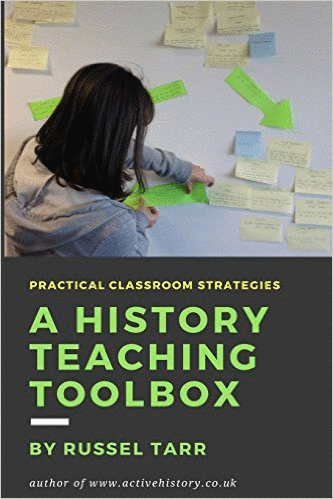Transform your history classroom
ActiveHistory provides educational, award-winning interactive simulations, decision-making games, self-marking quizzes, high-quality worksheets and detailed lesson plans for the school history classroom. All resources have been designed by full-time history teacher Russel Tarr.
An ActiveHistory subscription provides everything you need to construct and deliver a History course from start to finish for the entire 11-18 age range!
These consist not just of lesson plans, worksheets and teacher notes, but also multimedia lectures and interactive games and historical simulations ideal for remote learning and self-study.
World History teaching resources for the high school classroom: lesson plans, worksheets, quizzes and simulation games for KS3, IGCSE, IB and A-Level teachers.
This unit forms part of the World War One materials at ActiveHistory:

Causes of World War One
Life in the Trenches in World War One
Causes for Germany's Defeat in World War One
Remembrance Day: Activities for all Year Groups
Battlefields Trip: itinerary, workpack and follow-up activities
Origins of WW1 and WW2: Comparisons and Contrasts

Decision-Making Simulation: Can you survive life in the trenches?
"In this simulation you will be a British soldier who joins the army in 1914 to fight the Germans. You will learn about the conditions which soldiers lived and fought in, and the dangers they faced. There is a worksheet to go with this activity which you should complete as you proceed. You can also save your progress at any time so you can continue the game over several lessons or as homework. There is even a leaderboard!"
Life in the Trenches! [earlier version]
A decision making game, complete with worksheet and extension activities. A good way into the topic. This version is a simpler version of the newer simulation, more suitable for younger students or for classes with less time to devote to the investigation.
Propaganda and Censorship: How did the British government respond to the recruitment crisis?
A PowerPoint Presentation complete with questions. There is also a PowerPoint Presentation on The Defence of the Realm Act.
Why did the Gallipoli campaign fail?
This introductory multimedia presentation is followed by using these 27 sources to complete the group work task outlined in the final slides. Suggested follow-up activities are also provided.
Old Wulfrunians who died in WW1
Designed for students at my old school, but it might be of interest to other schools considering a similar project.
War poetry
A photocopiable worksheet of World War One poems, complete with questions. There is also a PowerPoint Presentation to accompany the task. I like to introduce this lesson by reading "1914" by Philip Larkin, and "In Memoriam" by Ewart Alan Mackintosh (both available on the web through a Google search!). This was a very literary age – there was no TV, radio, computers; the war generation was the first to have mass literacy thanks to the liberal reforms of the 1870’s; reading and writing books and poems provided both an escape from and a way of dealing with the horrors being faced, and language had to develop to meet the new challenges. “No man’s land”, “Tactics”, “Over the Top”, “Lousy”, “Souvenir”, “Rank and File” and “Trenchcoat” are all words introduced into the language at this time.
The Battle of the Somme
Students conduct a debate on the issues of whether Haig was a good General, whether the battle plan was crazy, and whether it achieved its objectives. They do this by:
(a) Completing this worksheet as the teacher goes through The Battle of the Somme PowerPoint;
(b) Completing this investigation workpack about the Somme Offensive.
Video: Richard Holmes: War Walks - The Somme (28m) | Student Worksheet | Teacher Answers
The late, great Richard Holmes is still the best TV military historian. Here's a video, worksheet and teacher answers on the Battle of the Somme.
Interactive Factual Tests
To consolidate knowledge and understanding before the sourcework exercise which follows, get students to take the following tests and jot down the highest scores they get at the end of the session:
Fling the Teacher Quiz
Alternatively, get all the students playing this quiz, and give each student a ranking based on how quickly they finish it compared to the others.
Sourcework Exercise
This is a good point at which to set students to work on this sourcework exercise (which comes complete with a markscheme).
Play Your Dates Right Quiz
World War One, 1914-1918 - a good way to round the unit off!
Social, Political, Economic and Cultural Consequences of World War One in Germany, Britain and the USSR
Students should open a copy of this table, and fill the gaps by playing one of the following quizzes:
"Who Am I?" Challenge - The Events of World War One
Each team will be presented with a clue about a key historical figure. They get 50 points if they guess it correctly. If they wish to 'pass', they get further (easier) clues but the points available steadily decline. An incorrect guess at any point means they get zero points for that round. You can play as many rounds as you wish. It's a great way to revise!

© 1998-2025 Russel Tarr, ActiveHistory.co.uk Limited (Reg. 6111680)
1 Torrin Drive, Shrewsbury, Shropshire, SY3 6AW, England
Privacy Policy | Contact






